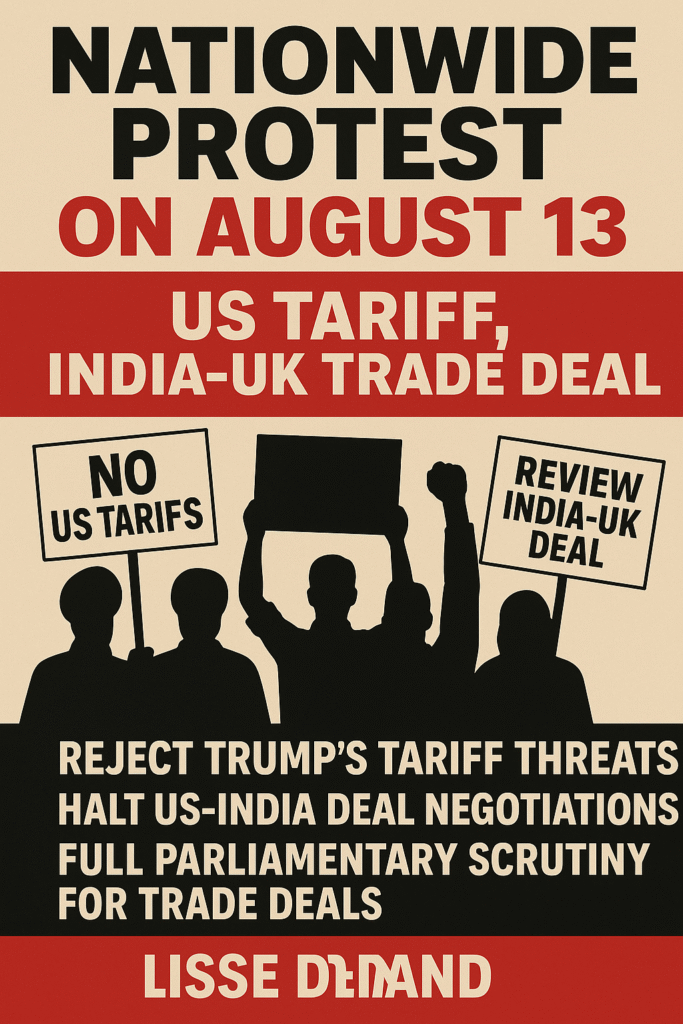Nationwide Protest on August 13: In a powerful display of dissent, a coalition of 10 Central Trade Unions and the Samyukt Kisan Morcha (CTUs-SKM) has announced a nationwide protest on August 13, 2025, rallying against two major international developments: US President Donald Trump’s tariff threats and the India-UK Comprehensive Economic Trade Agreement (CETA). The groups accuse both moves of threatening India’s economic sovereignty and compromising the rights of farmers and workers.

Why the Protest? CTUs-SKM Speaks Out
In a joint statement issued on Monday, CTUs-SKM called upon workers, farmers, students, and citizens to join mass mobilizations across the country. The protests will include tractor and motorcycle rallies, public meetings, demonstrations, and other actions led by affiliated organizations.
Their outrage centers on what they describe as “economic coercion” by the United States and “corporate imperialism” through trade agreements like the India-UK CETA. The coalition has sharply criticized the Indian government’s passive response, calling it a sign of surrender to Western interests.
Trump’s 25% Tariff Threat: A Spark That Ignited the Fire
The announcement comes in response to President Trump’s threat to impose a 25% tariff on Indian goods, along with a punitive levy targeting India’s oil trade with Russia. These actions have been denounced by CTUs-SKM as clear attempts by the U.S. to pressure India into conforming to Washington’s global trade agenda.
According to the protestors, such tactics reveal a double standard in American trade policy—promoting open markets for U.S. corporations while leveraging economic threats against sovereign nations.
India-UK CETA: A Deal Under Fire
Protesters argue that the recently signed India-UK CETA is another step toward economic subjugation, comparing it to the historical exploitation under the East India Company. According to CTUs-SKM, this agreement:
- Endangers India’s agriculture and dairy sectors
- Offers unfair advantages to foreign corporate giants
- Lacks transparency and public scrutiny
They claim the deal prioritizes corporate profits over national interest, especially at a time when India’s rural economy is already under severe strain.
Key Demands of the Protesters
The August 13 movement isn’t just about expressing anger. The protesters have laid out specific, actionable demands to safeguard India’s economic independence:
- Reject US Tariff Threats: India must assert its right to trade freely with all countries, including Russia.
- Review and Amend India-UK CETA: The current version must be reassessed with full transparency.
- Halt US-India Trade Deal Negotiations: Ongoing talks with the U.S. should be suspended to prevent corporate exploitation.
- Mandate Parliamentary Scrutiny for Trade Deals: All future trade agreements must be debated in Parliament and opened for public consultation.
Government’s Silence Criticized
CTUs-SKM did not hold back in criticizing the government’s response. They labeled it a case of “meek submission” to foreign pressure, accusing the administration of prioritizing diplomatic ties over national welfare.
They also warned of the potential dangers of a future India-US trade agreement, particularly in the agricultural sector. Activists fear that American agri-businesses like Cargill could soon gain unrestricted access to India’s food systems—leading to price crashes, farmer bankruptcies, and a major food security crisis.
A Nation at the Crossroads
The protest scheduled for August 13 is more than just a reaction to trade policy; it is being positioned as a battle for economic justice and national sovereignty. At stake, say the protesters, is the future of India’s self-reliance and the rights of its citizens to a transparent and people-first trade policy.
As India finds itself pulled between global powers, citizens are taking a stand—not just for today, but for generations to come.
Will the Government Listen?
With momentum building for what could be a massive nationwide mobilization, the big question remains: Will the government respond to these calls for accountability? Or will it continue down a path that critics say leads to economic colonization under a different name?
One thing is clear—the voice of the people will echo through every city and village on August 13, 2025.
